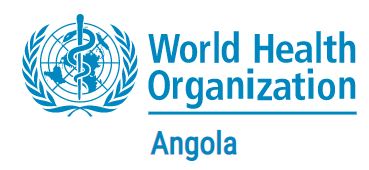With ongoing cholera outbreaks in neighbouring countries, Angola is stepping up preparedness measures to effectively respond to potential emergence of the disease in the country.
Over the recent weeks, the Ministry of Health, with support from World Health Organization (WHO), has developed a national cholera contingency plan outlining the key measures to be implemented to prevent and respond to an outbreak. The health authorities are enhancing disease surveillance and other response activities in high-risk areas along the border with Zambia and Democratic Republic of the Congo.
Priority measures include ensuring that health facilities have case definition – this is crucial in determining whether a patient is linked to an outbreak under investigation or not – and that cholera treatment protocols are available in all health facilities. Rapid response teams in border districts are being trained while health workers are receiving support on cholera treatment. Supplies of oral rehydration salts and intravenous fluids are also being prepositioned in health facilities in border areas.
“We are on the right path. Different ministerial departments, communities and partners are all involved in preparing activities in different areas according to the national contingency plan,” said Dr Helga Freitas, the National Director of Public Health. “Ensuring strong prevention and response capacity against cholera is a national endeavour and we’re all part of it.”
Efforts are also ongoing to identify all sources of untreated or polluted water. Additionally, the health authorities are distributing chlorine and chlorinating drinking water sources and are raising public awareness on cholera prevention and the importance of seeking early treatment among other preventive measures.
“We are confident about the measures that the country is adopting, and we hope that with everyone’s help, Angola can strengthen capacity in critical areas, especially in border areas, in terms of preparing health workers, prepositioning essential kits, access to treated water, mobilizing and engaging families, among others, to ensure effective surveillance, prevention and response to a possible cholera outbreak,” said Dr Humphrey Karamagi, Acting WHO Representative in Angola.
The measures are being caried out in 10 of the country’s 18 provinces by a national team of 28 experts, including eight from WHO, with greater focus in Cuando, Cubango and Moxico provinces near the border with Zambia and in Luanda Norte province which borders Democratic Republic of the Congo, where a cholera outbreak has been going on for several months.
“As a health professional, the ongoing activities are critical,” said Dr Yaslava Kango, a public health specialist in Lunda-Norte province. “The opportunity to be part of the refresher training with the participation of various social actors enabled us to share experiences and ensure that everyone can work in an integrated manner to protect lives.”
Angola has battled cholera outbreaks in the past. After a period without any outbreaks between 1995 and 2000, the country experienced a huge outbreak in 2011 resulting in 2284 cases and 181 deaths. The most recent outbreak occurred between 2016 and 2017 affected Cabinda, Luanda and Zaire provinces with a total of 252 cases and 11 deaths.
Distributed by APO Group on behalf of World Health Organization (WHO) – Angola.

